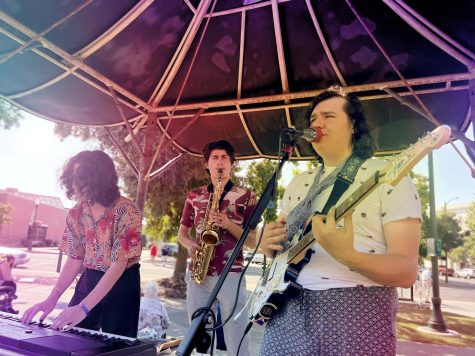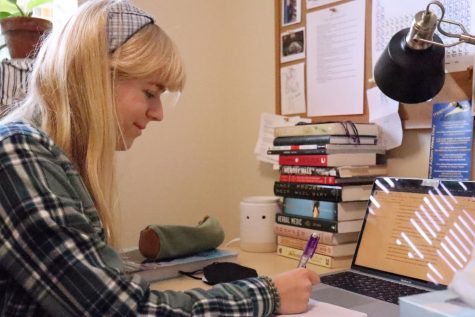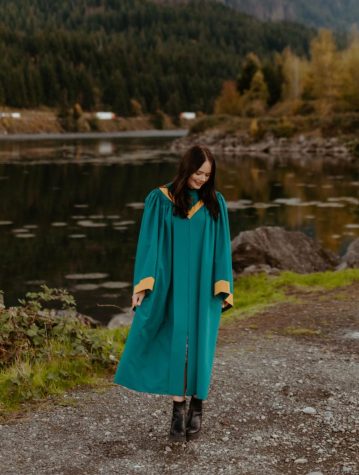A gift and a burden: Students discuss creativity
October 5, 2022
“I wish you always love and grief, because don’t you think that’s what drives your creative process?”
— “Dialog” by Tigran Suchyan, Armenian singer-songwriter; courtesy of Marina Balasanyan
In fifth grade, my teacher introduced a series of topics for in-class debates and writing assignments. One week she passed out an abbreviated psychology article titled “Cluttered Rooms Jump-Start Creative Minds.” The article was a kid-friendly version of a study done by the University of Minnesota that explored the impact of clean and messy rooms on people’s creative thinking processes. In short, the study found that individuals in messy rooms tended to be more creative, whereas those in an orderly room were less creative, but more charitable and focused.
The extent to which we can “measure” creativity is debatable. Still, we can use this idea to explore how the world (the giant and complicated “room” that we all live in) affects our own creativity. I was interested to see how Whitman and Walla Walla, our local “room”, impacts creativity for on-campus artists.
For Mo Dow, lead singer and co-songwriter of the on-campus band Wind-Up Birds, creativity isn’t something they consciously “do”; creativity is their way of being.

“The reason I play music is because I don’t really know what I’d do if I didn’t do it — it’s just my way of life,” said Dow. “In some ways, I can’t distinguish my college experience from being a musician; it was so transformative for me, and I’m a music major now.”
Dow explained that community guided their creative process. In creating and performing in Wind-Up Birds, Dow emphasized the heavy influence that their bandmates had in songwriting and live performance. Dow shared personal anecdotes about the band’s origins. From sneaking into recording studios to impromptu piano jam sessions, the group transformed from a two person recording effort into a live band.
We have the choice to expand our creativity to the edges of what we are willing to explore within ourselves. While your occupation may not seem creative at first glance, the idea of creativity as a “lifestyle” can pour beyond our academic, extracurricular and even personal lives, seeping into the way that we socialize as well.
“I make an effort to put people in my life who support my creativity,” first-year student Kaydence Meikle said.
Meikle explained that she finds this prioritization important as a “creative person.” This is easy to understand when so much of a creative person’s life is poured into their art, but shouldn’t we all think of ourselves as creative people? If we each have the unlimited capacity for creativity, what then defines a creative person?
The difference between being creative and being a creative is the willingness to sacrifice for inspiration.
“I try never to suppress my ideas,” said Abby Peck, a first-year creative fiction writer.
Peck recounted a time when an idea pulled her away from her textbook. She sacrificed studying time, choosing instead to follow a moment of inspiration brought about by one of the textbook illustrations.
Creativity helped her feel less isolated growing up as an only child, and writing became a coping mechanism. This coping mechanism has carried over into her academic life, and prioritizing her creativity has become a form of self-care.

“With being in school and going through classes, I’ve realized the fact that health is more important than your education,” Peck said.
Just as health is unique to each individual, health as a means for creativity is unique to each artist.
While many artists use substances to enhance their creativity and guide their process, others view the intersection of creativity and substances less favorably. Vocalist and jazz major Marina Balasanyan explained her perspective.
“Getting intoxicated and screaming … is very dangerous [for a singer],” Balasanyan said. “You have to regulate it because any substance can affect your voice.”
Beyond substances and screaming, Balasanyan explained how her day-to-day self expression has changed to prioritize caring for her voice.
“I’m a person who’s very expressive,” Balasanyan said. “I want to [be loud] sometimes, but I will keep it to myself just so my voice is in a comfortable space.”
The sacrifices that artists make to protect their creativity and health may not seem significant, but they form a continuous battle against our production-oriented culture.
“I think to be human is to make art,” Dow said. “The way our society is set up is to disrupt being a human being — we don’t [pay] any attention to the rhythms of the natural world.”
Self-care for creativity takes many forms — one of which is pushing back against “hustle culture” and working at an intentionally slow pace.
This intentional slowness allows us to draw from the very thing that makes us human: our emotions.
“I feel like there’s so much going on in my head and in my heart that I have to make music and poetry,” said Meikle.

As a songwriter, Meikle draws from her emotions as an invaluable reserve of inspiration; emotions fuel her creation. From a performance perspective, Balasanyan described how the ability to share emotions is what helps her present someone else’s art while still making it her own.
“My favorite thing to do is to relate. When it comes to performing, it comes from deep within, from passion, from empathy for the singer … I always want to perform [it] even when I have my own music out,” Balasanyan said.
As an audience member, intentional slowness can create near-transcendent experiences.
“I call it magic,” said Balasanyan. “Being able to … make your audience feel what you feel and put them in the same wavelength is a very special thing to me.”
The worlds that artists dream of may seem unrealistic, but creativity pushes us to reach for more — not for the sake of profit or productivity, but for self-fulfillment. The creative process pushes us to ask ourselves: how is my consumption of the world going to manifest into my creation?
James Baldwin’s essay “The Artist’s Struggle for Integrity” puts it best: “… all artists are finally the people who know the truth about us. Soldiers don’t, statesmen don’t, policemen don’t, union leaders don’t, only the poets.”
Creativity, in whatever form it takes, is how we push for progress and remain human. The role of the artist is a heavy burden to bear — if you choose to take it — because immense feeling requires a massive amount of energy. Sometimes it feels like it would be easier just to desensitize ourselves for the sake of productivity.
You don’t have to bear the great burden of yielding to inspiration and creativity though. Whether your creativity looks like poetry or chem-lab experiments, we can all benefit from slowing down and caring for ourselves so we may create and perform with energy and integrity.





